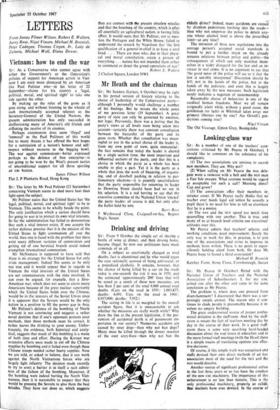Sir: The letter by Mr Paul Pulitzer (22 September) concerning
Vietnam seems to shed more heat than light upon the subject.
Mr Pulitzer states that the United States has The legal, political, moral, and spiritual right' to be in Vietnam. This seems to be wholly beside the point. The only justification which a nation should have for going to war is to protect its own vital interests. So far the administration has failed to demonstrate that such a vital interest exists. If one accepts the rather dubious premise that it is the mission of the United States to fight communism all over the world, then one is faced with the problem that there exist many different varieties of communism and getting rid of one heretical branch could indeed strengthen international communism.
Mr McNamara is supposed to have said that there is no strategy for the United States but only crisis management. Indeed this seems to be only too true and it would appear that in regards to Vietnam the vital interests of the United States are not commensurate with the risks involved. It can even be argued, for example, that a Sino- American war, which does not seem to alarm many Americans because of the great nuclear superiority which the United States holds over the Chinese, would be in the interests of the Soviet Union since it is apparent that the Soviets would be the only nation in a position to fill the power gap in Asia.
Mr Pulitzer's defence of the bombing of North Vietnani is not convincing and suggests a rather novel doctrine that if one's opponent protests your methods, then those methods must be correct. It rather leaves the thinking to your enemy. Unfor- tunately, the evidence, both historical and analy- tical, suggests that much of this bombing is a waste of both time and effort. During the Korean war extensive efforts were made to cut off the Chinese supplies by bombing and it failed even though these Chinese troops needed rather heavy supplies. Now we are told, or asked to believe, that it can work against the North Vietnamese forces who are largely light infantry The decision made recently to try to erect a barrier is in itself a tacit admis- sion of the failure of the bombing. Moreover, if the bombing were indeed hurting the North Viet- namese, then it is reasonable to suspect that they would be pressing the Soviets to give them the best missiles. They have not done so, which suggests
they are content with the present obsolete missiles and that the bombing of the country, which is after all essentially an agricultural nation, is having little effect. It would seem that Mr Pulitzer, not to men- tion the Pentagon and the White House, failed to understand the remark by Napoleon that 'the first qualification of a general-in-chief is to have a cool bead. . . . There are men who, due to their physi- cal and moral constitution, create a picture of everything ... nature has not intended them either to command or direct the grand operations of war.'


































 Previous page
Previous page